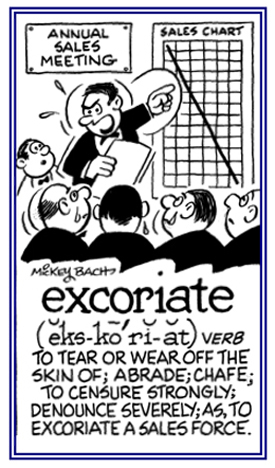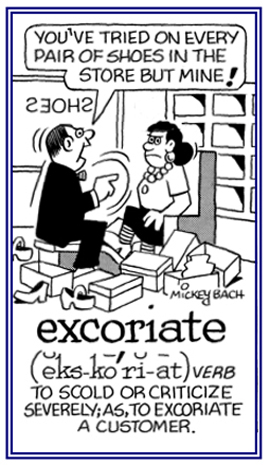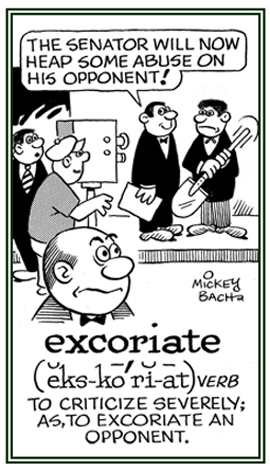cori-
(Latin: skin; hide, leather; the hide stripped off)
coriaceous
1. Of or like leather, especially in texture.
2. Resembling or made to resemble leather; tough but pliable.
3. Leathery, tough; sometimes a reference to bacterial cultures.
4. Having a leathery appearance and texture; used especially of a fungal fruiting body.
2. Resembling or made to resemble leather; tough but pliable.
3. Leathery, tough; sometimes a reference to bacterial cultures.
4. Having a leathery appearance and texture; used especially of a fungal fruiting body.
corium
1. The vascular layer of the skin, the derma.
2. The leathery middle part of the forewing of some insects.
2. The leathery middle part of the forewing of some insects.
excoriable (adjective) (not comparable)
1. Subject to being denounced or condemned: Jim's excoriable behavior and speech in class was so severe that he was immediately suspended from school by the principal.
2. Capable of skin being rubbed or scraped off: When Jill fell on the pathway, the cement caused an excoriable injury.
2. Capable of skin being rubbed or scraped off: When Jill fell on the pathway, the cement caused an excoriable injury.
excoriate (verb), excoriates; excoriated; excoriating
1. To chastise, to criticize, or to censure strongly; to denounce: James wrote an editorial in the newspaper which excoriated the local city administration for raising taxes for more food products.
2. To tear, to strip, or to wear off the body tissue: Shirley's doctor excoriated some of the skin off her elbow after she fell down on the slippery sidewalk.
3. Etymology: from Latin excoriare, "to strip the hide or skin off"; from ex-, "off, from" + corium, "skin, hide; leather".

© ALL rights are reserved.

© ALL rights are reserved.

© ALL rights are reserved.
Go to this Word A Day Revisited Index
2. To tear, to strip, or to wear off the body tissue: Shirley's doctor excoriated some of the skin off her elbow after she fell down on the slippery sidewalk.
3. Etymology: from Latin excoriare, "to strip the hide or skin off"; from ex-, "off, from" + corium, "skin, hide; leather".



Go to this Word A Day Revisited Index
so you can see more of Mickey Bach's cartoons.
excoriated
1. A stated opinion that a play, a book, a political action, etc. was very bad.
2. Flayed; galled; stripped of skin or the cuticle; abraded.
3. A strong disapproval about someone or something which has been expressed verbally or in writing.
2. Flayed; galled; stripped of skin or the cuticle; abraded.
3. A strong disapproval about someone or something which has been expressed verbally or in writing.
excoriating
Flaying; galling; stripping of the cuticle or skin.
excoriation
1. A scratch or abrasion (process of wearing away by friction) of the skin.
2. The act of excoriating or flaying, or state of being excoriated, or stripped of the skin; abrasion.
3. A superficial loss of dermal substance, as may be produced on the skin by scratching.
4. Abrasion of the epidermis or of the coating of any organ by trauma, chemicals, burns, or other causes.
2. The act of excoriating or flaying, or state of being excoriated, or stripped of the skin; abrasion.
3. A superficial loss of dermal substance, as may be produced on the skin by scratching.
4. Abrasion of the epidermis or of the coating of any organ by trauma, chemicals, burns, or other causes.
A person who removes the hide or fur of; literally or figuratively.
neurotic excoriation
1. A self-induced skin lesion, inflicted by the fingernails or by other physical actions.
2. A self-inflicted excoriation, usually on the face, back, or shoulders of a subject when under stress.
2. A self-inflicted excoriation, usually on the face, back, or shoulders of a subject when under stress.
Cross references directly, or indirectly, involving the "skin": callus-; chorio-; cicatri- (scar); cuti-; hymen-; lepido- (scab, scale); papulo- (pimple); psoro- (itch, mange); pustu- (blister, pimple); rhytid- (wrinkle); scabio- (mange, itchy); sebo- (grease, oil).
<img src="/img/left_arrow_sm.gif" alt="" /> <img src="/img/right_arrow_sm.gif" alt="" />
Showing 1 page of 9 main-word entries or main-word-entry groups.
